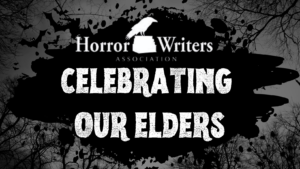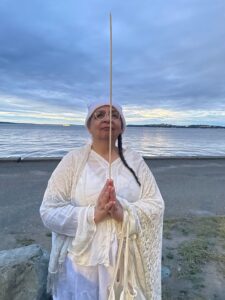Celebrating Our Elders: Interview with Nisi Shawl


Photo Credit: Misha Stone
Nisi Shawl’s debut novel Everfair, an alternate history of Africa’s Congo region, was a Nebula Award finalist. They’re the author of the Otherwise Award-winning story collection Filter House. They edited both volumes of the acclaimed New Suns anthology series, winner of the World Fantasy, Locus, and Ignyte awards. With Cynthia Ward they co-wrote Writing the Other: A Practical Approach, a standard text on inclusivity for over a decade. Recent publications include the horror collections Our Fruiting Bodies and Exploring Dark Short Fiction 3: A Primer to Nisi Shawl, as well as Speculation, a middle grade fantasy novel about redeeming a family curse.
Did you start out writing or working in the horror field, and if so why? If not, what
were you writing initially and what compelled you to move into horror?
When I started out, most of the time, I didn’t think I was writing horror. People who’ve read my stories have convinced me otherwise. I think some of the problem for me stems from my reluctance to be ghettoized. Ghosts are ancestors—they’re not scary. They’re crucial to the world I live in. Yet the cultural divide that currently exists between people of color and people of pallor puts this fictional element squarely in horror territory.
Furthermore, in my lived reality, monstrous beings are in control of the apparatus of oppression, which is an apparatus many writers of color are nauseatingly familiar with. So my attitudes toward fictional monsters, my analyses and representations of them based on what I’ve experienced, are going to differ substantially from the analyses and expectations of a white author who has been raised with unacknowledged privilege: privilege in their daily interactions with the medical establishment, with financial institutions, so on, so forth. Becoming conscious of these factors in what I do and how it is received has made it possible for me to accept my work as belonging, in some ways, within the horror category.
Who were your influences as a writer when you started out and who, if anyone, continues to influence you?
When I started writing for publication at the age of 20, my biggest influences were feminist science fiction authors: Samuel Delany, Joanna Russ, and Suzy McKee Charnas, to name a few. Also, I was tapped into a rich, throbbing vein of fantasy, and adoringly read work by Ishmael Reed, Tom Robbins, Richard Brautigan, and George MacDonald. Then there was the non-genre stuff by authors such as Anais Nin, Knut Hamsun, and Colette. Of those I’ve named, I’ve recently revisited the oeuvres of Colette, Brautigan, Reed, and Delany. But what even is influence? Is it the act of providing a model, or maybe of providing a *bad* example, of telling one what *not* to do? Can you actually see the impact of my influences’ writing on mine? In the topics I pick or shy away from? Can you see similarities between what we do on the page?
Notably, none of these influences of mine are categorized as horror authors. Of those, the only one I’d claim as an author whom I have paid close attention to is the late, great Peter Straub.
How have the changes in horror publishing over the past decades affected you?
The inclusion of greater numbers of horror writers of color has caused me to re-evaluate my relationship to the genre.
Do you think you’ve encountered ageism? If so, how do you counteract or deal with it?
Clearest in my mind at the moment is the segregation by age I encountered while attending the most recent International Conference on the Fantastic in the Arts. This is an annual blended academic/professional conference taking place in Orlando freaking Florida, and I went because I knew I could spend most of my socializing time outdoors. But I quickly noticed that the informal groups accreting around the hotel’s casually placed tables were self-sorting by age. There were older pros like Joe Haldeman and Stephen Donaldson seated in one area, with another area nearby filled with younger pros like Sam Miller and Craig Gidney. I’m 67, so I properly belonged with the “elders,” but I was also drawn into convos with the baby authors, and I probably spent the bulk of my time in their company.
No one attempted to move me from one group to the other, but the highly visible split disturbed me nonetheless. When I spoke to a younger friend about it, she opined that it was the responsibility of ICFA’s elders to invite its newbies to sit with them and share their glory. “They are the hosts,” she pointed out. I had to explain that we elders often feel overlooked, underappreciated, outmoded, and cast aside. We’ve witnessed multiple members of our cohorts die and be forgotten. We’re not possessed of unlimited and inalienable power, and we sure don’t see ourselves that way.
The next day, my friend went on a long expedition with three elders and had a blast. Another example of how to build bridges, not walls. That’s how I’d like to counteract ageism, and how I’d like to see it counteracted.
What do you wish you knew when you were just getting into the field?
That I’d eventually reach this point.
Do you have any advice for writers just starting out?
Be kind! Be kind to editors, illustrators, readers, and other authors. Be kind to receptionists and delivery people and drivers and teachers—be kind to everyone! Don’t waste your time, which is precious, of course. But greet the highest manifestations of everybody you encounter and give them all your sincerity and love. Those things will return to you a thousand-fold, often when you could not possibly expect them.
Do you think older characters are represented fairly and honestly in horror fiction?
I haven’t read widely enough in the field to have an opinion. But if horror is like the rest of literature, the answer has to be a resounding “No.”
What are some of your favorite portrayals of older characters?
In horror there’s one I deeply, deeply admire: Nora Chancel, protagonist of Peter Straub’s novel The Hellfire Club. Though she’s not that old (by which I mean she’s described as being younger than I am now), Nora is menopausal. She has aged out of the all-desirable 20-to-35 demographic. No more baby making. Now she can focus full time on kicking ass. Dripping with sweat, her heart pounding, she manages to face down the most intimate and provocative of her fears. My hero!
Do you have anything you’d like to add that we haven’t asked?
Not a thing. Thank you.



